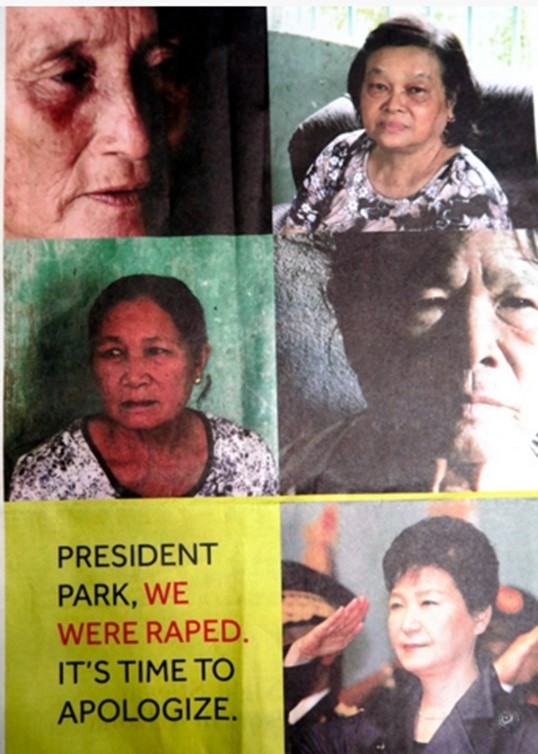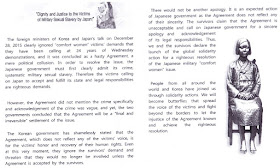シドニーにおける慰安婦像設置運動に対し、Australia-Japan Community Network(AJCN)が、韓国人の方々に対するメッセージを発表しました。
韓国人の皆さん、平和に暮らせませんか?
~また再びの慰安婦像設置問題をめぐって~
日本語、英語、韓国語の順で以下にご紹介します。
***********************************************
2016年7月18日月曜日
韓国人の皆さん、平和に暮らせませんか?
~また再びの慰安婦像設置問題をめぐって~
AJCN代表 山岡鉄秀
残念なことに、シドニーで再び、韓国系反日団体が慰安婦像を建てようと活動しています。彼らは、昨年末の慰安婦問題に関する日韓両政府による、この問題を不可逆的に解決するという合意に「屈辱」だと反発し、世界中で慰安婦像の数を増やすと宣言した、北朝鮮との繋がりを指摘されている挺対協と連動しています。日韓合意に反対するのは勝手ですが、関係のない第三国で、地域の融和を乱す敵対的な行動を取ることは極めて不適切です。昨年、韓国系の住民の多いストラスフィールドの市議会において、コミュニティの和を乱すべきではないという理由で慰安婦像設置要求が却下されました。しかし、そうしたマジョリティーの意見を無視し、言論の自由を悪用して日本を貶めるために活動している一部の人たちによって、心ある韓国系の人たちまでもが反日であると誤解されてしまうことは遺憾です。
この反日団体に属する韓国人たちは、我々が反対していることについて、「日本人が反対するのは、過去の蛮行をばらされたくないからだ」と言っています。これは常々感じることですが、彼らは歴史的事実を検証することには興味がないようです。驚くべきことに、日本では完全に作り話と認定され、朝日新聞も記事を取り消して謝罪した「朝鮮半島で女性狩りを行ったという吉田清治」なる人物の証言が、韓国ではつい最近まで事実として大学受験生向けの教育テレビで教えられていたことがわかりました。米国公文書図書館で見つかった記録によると、戦争中に米軍に捕獲された朝鮮人捕虜が異口同音に「出会った慰安婦はみな自主的な志願か、親に売られた娘たちで、それは朝鮮の文化では普通のことだった。もし、日本人が暴力的に女たちを拉致しようとしたら、朝鮮の男たちは老若を問わず、死を賭して抵抗しただろう」と答えています。確かに、セオウル号事件の時の家族の行動を見れば、当時の朝鮮人が無抵抗だったとは到底想像できません。まして、当時の朝鮮半島の警察官のほとんどが朝鮮人であり、日本軍にも何十万という朝鮮人男性が志願していました。にもかかわらず、女性の強制連行に抵抗した暴動はひとつも記録されていないのです。この事実ひとつを見ても、吉田清治の証言が全くのでたらめだったことがわかりますが(吉田自身がフィクションだと認めました)、実は、一番最初に「吉田証言が事実ではない」と発表したのは、実際に済州島などで調査した韓国人ジャーナリストだったのです。
我々はべつに、豪州で歴史論争をする気持ちはありません。しかし、豪州に暮らしている戦後生まれの我々にはまったく関係のない過去の出来事であり、日本政府がすでに何度も謝罪していることに関して、現在もシドニーなどでデモ活動が続けられている上、慰安婦像が建つことなどによって日系の子供たちが学校で虐められるようになることなどを黙ってみているわけにはいきません。つい最近、慰安婦像設置予定地である教会の牧師さんが、我々日本人のことを犯罪者と呼ぶような発言をしている動画がインターネット上にあげられましたが、それを観た、クリスチャンの日本人や地元のオーストラリア人がどれだけ悲しい思いをしたかご存知でしょうか?
韓国軍の兵士たちが朝鮮戦争やベトナム戦争で女性を虐殺したことに関して、シドニーの韓国領事館前で毎月デモ活動をされ、朝鮮戦争やベトナム戦争時の慰安婦像を世界中に設置する、と言われたら、韓国系の方々はどう感じるでしょうか?
彼らは、韓国自身がしてきたことを知らないのか、それとも、知らないふりをしているのでしょうか?朝鮮戦争中、パク・クネ大統領の父親であるパク・チョンヒの大統領命で韓国軍経営による国連軍向けと韓国軍向けの慰安所が作られ、女性達は「慰安婦」「洋公主(ヤンゴンジュ)」と呼ばれていました。また、ベトナム戦争中には、韓国軍により多くのベトナム人女性が強姦された挙句に惨殺されたり、売春婦として働かされ、ライダイハンと呼ばれる何千人もの混血児を残しました。彼らは韓国兵に見捨てられた末、ベトナム社会で差別され、肩身の狭い思いをしながら生きています。これらは検証された事実で、ベトナムに行くと、今でも韓国軍の蛮行を描写した記念碑を見ることができます。一方、女性の人権問題は現在も深刻です。韓国の国会議員が「10万人の韓国人女性が海外で売春をしている」と発言しましたが、そのうち5万人が日本で働いていると言われ、北米でも多くの韓国人売春婦が当局の摘発を受けています。韓国の人口比を考えれば、驚くべき人数だと言えるでしょう。ここシドニーでも1千人ともいわれる韓国人女性が売春をしていますが、彼女たちの多くは高金利の借金漬けになって身動きが取れなくなっているのです。彼女たちを搾取しているのは韓国人のブローカーです。
慰安婦像を建てて日本を糾弾しようとしている韓国人たちは、現在、目の前で搾取されている韓国人娼婦たちを救う努力をしているのでしょうか?我々は、人種を問わず、戦争中に苦労した全ての女性に深い同情の念を持つべきです。そして、現在の問題に共同で対処すべきです。他民族を攻撃して、豪州が誇る多民族主義を脅かしている時ではありません。
豪州の日本人はこれまで、どの人種ともいさかいを起こさず、平和に暮らしてきました。しかし、一部の韓国人による反日運動が始まって以来、韓国系の店やレストランを避ける日本人が増えていることは大変残念です。今まで仲良くしていた韓国系の友人や配偶者との間に亀裂が生じて悲しんでいる日本人も多くいます。豪州に住んでいる日本人、韓国人にとっては、この国でいかに調和し協力しあって生きていくかの方が大切なはずです。我々は心ある韓国系の人たちと共に、この国の平和と未来を守っていきたいと願っています。

ベトナムに残る韓国軍による現地人虐殺記念碑
***********************************************
18 July 2016
To everyone in the Korean community; Can we live peacefully together in Australia?
As you may be aware, the Japanese government has made another apology and promised to give 1 billion yen to South Korea to “finally and irreversibly” resolve the controversial “Comfort Women” issue at the end of last year. Unfortunately, however, a group of people with Korean background is still trying to erect the Comfort Women statue in Sydney. This group of people have strong connections with Chon Dae Hyup, a prominent organisation that declared to erect more “Comfort Women” statues around the world and jeopardise the governmental agreement. Chon Dae Hyup is believed to have ties with North Korea and it has been on the watch list of the South Korean government.
No matter how they object to the agreement, however, it is extremely inappropriate to take this antagonistic action and disturb harmony in a country such as Australia that has nothing to do with this issue. Last year, in Strathfield where many people with Korean background reside, the proposal to erect the Comfort Woman statue was rejected by the Council, reasoning that it may cause significant disturbance to the peace and communal harmony. Despite the peaceful opinion of the majority, some people are even more actively disparaging Japan by abusing their freedom of speech. Because of this, it is truly regrettable that even the majority of thoughtful, considerate Korean people are misunderstood to be a part of this anti-Japan group. Through our efforts to stop the erection of the statue in Strathfield last year, we met many Korean people who said that they didn’t want the statue in Australia, but they were afraid to speak up because they were worried about their family’s safety in South Korea if they appeared to be pro-Japanese (up until the governmental agreement was made between two countries the South Korean government was using this issue as a political tool to gain power over Japan).
Koreans belonging to this anti-Japan group say, the reason of why Japanese people object is “that they do not want their barbaric act of past to be exposed.” However, this is always the case that they are not seem to be interested in investigating historical facts. Are they really interested in representing history correctly? It came to be known that up until recently the educational TV program for high school students in South Korea had been broadcasting the account of a Japanese communist, Seiji Yoshida, who claimed in his novel he conducted “abduction of women” on the Korean Peninsula as part of a Japanese military operation. Although his testimony was reported by the Asahi Newspaper as a fact at the time, he later confessed that it was a fictional story. Since then The Asahi Newspaper has withdrawn the articles and apologised to its readers. According to the official report in the US Archives Library, South Korean soldiers in the Japanese army who were arrested as prisoners of war by the US army during the World War II testified that:
“All Korean prostitutes that PoW have seen in the Pacific were volunteers or had been sold by their parents into prostitution. This is a proper Korean way of thinking. Conscription of women by the Japanese army would have outraged the old and young alike and they would not have tolerated such a scheme. Men would’ve risen up in rage, killing Japanese no matter what the consequences might have been.”
Please note that most of the police officers in Korea were Koreans and several hundred thousands of Korean men also volunteered their services to the Japanese Army. What were they doing while their women were being abducted by the Japanese Army if the story were true? Furthermore, when Yoshida published his fictional novel it was actually a Korean journalist who investigated the incidents on Jeju Island that he wrote about and was told that no such abductions ever took place by the Japanese army.
We are not really interested in arguing over historical controversies here in Australia. However, we cannot remain silent, knowing that the anti-Japan demonstrations are still continuing and the potential erection of the Comfort Woman statue may cause racial abuse of Japanese children in schools here in Australia. The Japanese government has already made apologies numerous times and made many efforts to resolve this issue.
This year, in spite of our efforts to keep the harmony, the minister of Ashfield Uniting Church is supporting the erection of the statue on his church land. What really upset us who live in the local community was that his interview regarding the statue was posted on Facebook by the anti-Japan activists group, and he called the Japanese people as “perpetrators.” How sad did Christian Japanese and local Australians feel by watching this video?
How do the Korean people feel, if political demonstrations are conducted in front of the Korean Consulate General of Sydney repeatedly accusing them of war crimes that happened so many years ago? How would you feel if your church minister called you a perpetrator for something that you didn’t do? How would you feel if the ex-comfort women from the Korean War and Vietnamese War erect the statues all over the world against your government?
Are you aware that the Korean government still has not made any apologies to the comfort women of the Korean War nor to the victims of the Vietnam War? The fact that when Park Chung-hee who was the President at the time, the father of the current President Park Geun-hye, was directly involved in setting up comfort women stations under his governmental management for both UN troops and Korean troops during the Korean war. In the Vietnam war, Korean soldiers engaged in rape and murder of thousands of Vietnamese women, and forced Vietnamese women to work as prostitutes. The worst consequences of those rapes are the thousands of children born out of these barbaric acts- called the Lai Dai Han, a term for mixed blooded children who are viewed as disreputable and shunned by society to this very day. These are verified facts, with memorials which describe the Korean troops’ atrocities towards Vietnamese women in Vietnam during that war.
Many years have passed since then but the violation of Woman’s human rights in South Korea still continues as a very serious issue today. As members of the South Korean Parliament stated that “100,000 Korean women are working as prostitutes overseas,” half of them are working in Japan, and many of them are arrested in the US. The number of women involved in this sex industry is considerably large in relation to the population of South Korea. In Sydney, it is estimated that a thousand Korean women are working as prostitutes and many of them are forced to work in order to pay off debts with super-high interest rates that they owe to the Korean brokers who exploit them.
Are anti-Japan activists really making efforts to rescue these Korean prostitutes who are being exploited in today’s world? Shouldn’t we be compassionate towards all women who suffered during the war? Isn’t it more important to deal with the current issues rather than something that happened more than 70 years ago? Shouldn’t we be living here in Australia with the mind that values Australian multi-culturalism, diversity and harmony?
The Japanese community in Australia have lived in peace and harmony for decades, and never had any conflict with any other racial groups. However, because of the anti-Japan propaganda carried out by the people who have a political agenda to divide the community, it is sad that many Japanese people began to feel afraid of going to Korean shops and restaurants. Some Japanese people who have Korean partners and/or Korean friends are finding it more and more difficult to deal with this issue without damaging their relationships.
It is regrettable that our community harmony has been affected by this politically motivated anti-Japan propaganda, involving many innocent people and wasting our precious time and energy on an issue that is irrelevant to our community. We sincerely hope and pray for all our sakes that we can put our community harmony first. The majority of Japanese and Korean people in Australia understand the significance of sharing harmony, cooperation, and respect towards others. We wish to keep life and the future of this country in peace, with thoughtful South Korean people.
T Yamaoka
President, Australia-Japan Community Network (AJCN)

A monument depicting Korean troop’s war crimes during the Vietnam War
***********************************************
한국인 여러분께 평화롭게 살아 보면 어떨까요?
∼ 다시 일어난 위안부 소녀상 설치 문제를 둘러싸고 ∼
유감스럽게도 시드니에서 한국계 반일단체가 또 다시 위안부 소녀상을 세우자고 활동중입니다. 그들은 작년말에 위안부 문제에 관해서 한일 양국정부가 이 문제를 불가역적으로 해결하기로 합의한 것을 굴욕이라고 반발하고 전세계에서 위안부 소녀상을 더 세우려고 하는, 북한과의 관계를 지적되는 정신대문제대책협의회와 연계하고 있습니다. 한일 합의에 반대하는 것은 자유라고 하더라도 관계가 전혀 없는 제삼국에서 지역 융화를 깨는 적대적인 행동을 취하는 것은 지극히 부적절합니다. 작년에 많은 한국계 주민들이 사는 스트라스필드 시의회에서 커뮤니티의 융화를 깨서는 안된다는 이유로 위안부 소녀상 설치 요구가 각하되었습니다.그런데 그런 대다수 주민의 의견을 무시하고 언론의 자유를 악용함으로써 일본을 비방하는 활동을 하고 있는 일부 사람들 때문에 양식이 있는 한국계 주민들까지 반일이라는 오해를 살 수 있는 것은 안타까운 일입니다.
이 반일단체에 속하는 한국인들은 일본인들이 반대하는 것을 “과거의 만행을 폭로되고 싶지 않기 때문이다”고 말합니다. 이것은 늘 느끼는 것이지만 그들은 역사적 사실을 검증하는 것에는 관심이 없는 것 같습니다. 놀랍게도 일본에서는 완전히 조작된 이야기로 인정되었으며 아사히신문도 기사를 취소하고 사죄한 “한반도에서 여성들을 사냥했다고 하는 요시다 세이지” 라는 인물의 증언이 한국에서는 극히 최근까지 진실 이야기로 수능생을 위한 교육 텔레비전에서 가르쳤던 것을 알게 되었습니다. 미국 국립보존기록관에서 찾은 기록에 의하면 전쟁중에 미군에 잡힌 조선인 포로가 이구동성에 “만난 위안부는 모두 자주적인 지원 아니면 부모가 팔아버린 딸들이며 그것은 조선 문화에서는 보통 일이었다. 만일 일본인이 폭력적으로 여자들을 납치하려고 한다면 조선 남자들은 노약을 막론하고 목숨을 걸어서라도 저항했을 것이다”고 대답했습니다. 과연 세월호 참사 때의 가족들 행동을 보면 당시 조선인이 저항하지 않았다는 것은 도저히 믿을 수가 없습니다. 하물며 당시 한반도 경찰관 대부분이 조선인이었으며 수십만에 이르는 조선인 남성들이 일본군에 지원하고 있었습니다. 그럼에도 불구하고 여성 강제 연행에 저항하기 위한 폭동은 하나도 기록되지 않았습니다. 이 사실 하나만 보아도 요시다 세이지의 증언이 완전 엉터리이었던 것을 알 수 있는데 (뒤에 요시다 본인이 그것이 픽션임을 인정했습니다) 실은 제일 먼저 “요시다 증언이 사실은 아니다” 그렇게 발표한 것은 제주도 등에서 실제로 조사한 한국인 저널리스트였습니다.
저희들은 호주에서 역사논쟁을 벌이려고 하는 것은 아닙니다. 그러나 호주에 사는, 전쟁 이후 태어난 저희들에게는 전혀 관계가 없는 과거사이며 일본 정부가 이미 몇 번이나 사죄한 일을 둘러싸고 아직도 시드니 등에서 시위 활동이 계속되고 있는 데다가 위안부 소녀상이 세워지는 바람에 일본계 어린이들이 학교에서 괴롭히는 것을 그냥 보고 있을 수만 없습니다. 조금 전에는 위안부 소녀상 설치될 교회의 한 목사님이 일본인을 범죄자 취급하는 듯한 발언을 하는 동영상이 인터넷에 올랐는데 그것을 본 기독교도인 일본인과 현지 호주인이 얼마나 슬퍼했는지 생각해 본 적이 있습니까?
한국군 병사들이 한국 전쟁과 베트남 전쟁 때 여성을 학살한 것을 이유로 주 시드니 한국영사관 앞에서 매월 시위활동을 하겠다, 한국 전쟁과 베트남 전쟁 때 위안부를 위로하기 위한 소녀상을 전 세계에 세우겠다, 그런 소리를 들으면 한국계 여러분께서는 어떻게 느낍니까?
그들은 한국이 해 온 짓들을 모르는 것일까요, 아니면 모르는 척하는 것일까요? 한국전쟁 때 박근혜대통령의 아버지인 박정희대통령 명령으로 한국군 운영하에 UN군과 한국군을 위한 위안소가 만들어졌고 여성들은 위안부 또는 양공주로 불렸습니다. 그리고 베트남전쟁 중에는 많은 베트남 여성들이 한국군에 강간당한 끝에 학살되기도 하고 매춘부 일을 강요되기도 하고 라이따이한으로 불리는 수천 명이나 되는 혼혈아를 남겼습니다. 한국병사에게 버림 받은 그들은 베트남 사회에서 차별당하고 위축되면서 살고 있습니다. 이것들은 검증된 사실이며 베트남에 가 보면 지금도 한국군의 만행을 묘사한 기념비를 볼 수가 있습니다. 한편 여성의 인권문제는 아직도 심각합니다. 한국 국회의원이 “10만 명의 한국 여성이 해외에서 매춘 일을 하고 있다”고 발언한 적이 있는데 그 중 5만 명이 일본에서 일하고 있다고 하며 또 북미에서 많은 한국 매춘부가 당국에 적발되었습니다. 한국 인구를 생각하면 놀라울 정도의 수라고 말할 수 있습니다. 시드니에서도 1000 명이나 되는 한국 여성이 매춘 일을 하고 있는데 그 여성들 대부분은 고금리 빚 때문에 어쩔 수 없는 상황에 빠져 있는 것입니다. 그녀들을 착취하는 것은 한국인 브로커입니다.
위안부 소녀상을 세우고 일본을 규탄하려는 한국인들은 지금 현재 눈 앞에서 착취되고 있는 한국 여성들을 구하기 위한 노력을 하고 있는 것일까요? 사람이면 인종을 막론하고 전쟁 중에 고생한 모든 여성에게 깊이 동정해야 합니다. 그리고 지금의 문제에 공동으로 대처해야 합니다. 타민족을 공격함으로써 호주가 자랑하는 다민족주의를 위협할 때가 아닙니다.
호주에 사는 일본인은 지금까지 어느 인종과도 문제를 일으킬 일이 없이 평화로이 살아 왔습니다. 그러나 일부 한국인이 반일운동을 시작한 이후 한국계 가게와 식당을 피하는 일본인이 늘어나고 있는 것은 대단히 유감스럽게 생각합니다. 지금까지 친하게 지내 오던 한국계 친구,부부 사이에 균열이 생겨 슬퍼하고 있는 일본인도 많습니다. 호주에 사는 일본인과 한국인에게는 이 나라에서 어떻게 하면 조화롭게 서로 협력해서 살아 갈 수 있을지가 더 중요할 것입니다. 저희들은 양식 있는 한국계 사람들과 함께 이 나라의 평화와 미래를 지키고 싶습니다. (AJCN대표 야마오카 데쓰히데)
베트남에 남은 한국군에 의한 현지인 학살 기념비.

베트남에 남은 한국군에 의한 현지인 학살 기념비.
***********************************************





